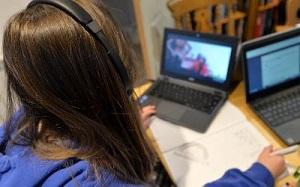You are here
- Home
- Business and Law in the time of COVID-19
- Innovation adopted during COVID-19 is now “business as usual” according to OU research
Innovation adopted during COVID-19 is now “business as usual” according to OU research

The Leading school learning through COVID-19 and beyond project, led by Dr Jacqueline Baxter, together with Dr Katharine Jewitt and University of Reading colleague Professor Alan Floyd, are investigating online learning and strategic planning through, and post, lockdown in English secondary schools.
Early findings indications
New and innovative practices adopted during COVID-19 born out of necessity are reported as now being ‘business as usual’. An example of this is a wider curriculum offering by schools collaborating to run some subjects online. Another example is parent evenings, once held face-to-face and often poorly attended, particularly in schools in challenging areas, have been much more successful online. Several school leaders state their intention to continue this practice, along with governor meetings and staff meetings.
There is considerable evidence of pedagogical innovation and creativity. Leaders report evidence of new ideas being tried and tested by teachers, free from the normal constraints. Schools are working more collaboratively, sharing resources, running online book clubs for Continuous Professional Development and co-facilitating staff development online events. They also report new roles being created as a result of an enhanced focus on digital learning.
In terms of quality assurance, some schools have introduced strategies for peer observation of teaching, virtual learning walks, and other innovations in order to promote and sustain good practice. Some respondents reported using online engagement statistics in order to measure learner engagement.
I can see a tremendous opportunity for schools to develop their creativity in more diverse ways through online collaboration than perhaps they have been able to explore individually. My hunch is that the digital environment may make people think in ways they have not been able to think just by the nature of its virtual-ness, to play, to explore, the unregulated-ness of it, compared to a lot of educational spaces which are constrained by politics and culture.
Dr Katharine Jewitt, Postdoctoral Research Associate
This article first appeared on the open.ac.uk website. Click here to read the original article.
Related content
Upcoming Events
Navigating Migration and Employment: Opportunities for Inclusive Futures
Tuesday, June 3, 2025 - 11:00 to 13:00
Online with Microsoft Teams
The Liminal Spaces of the Regional Economy
Wednesday, June 4, 2025 - 14:00 to 15:30
Online - via Teams
